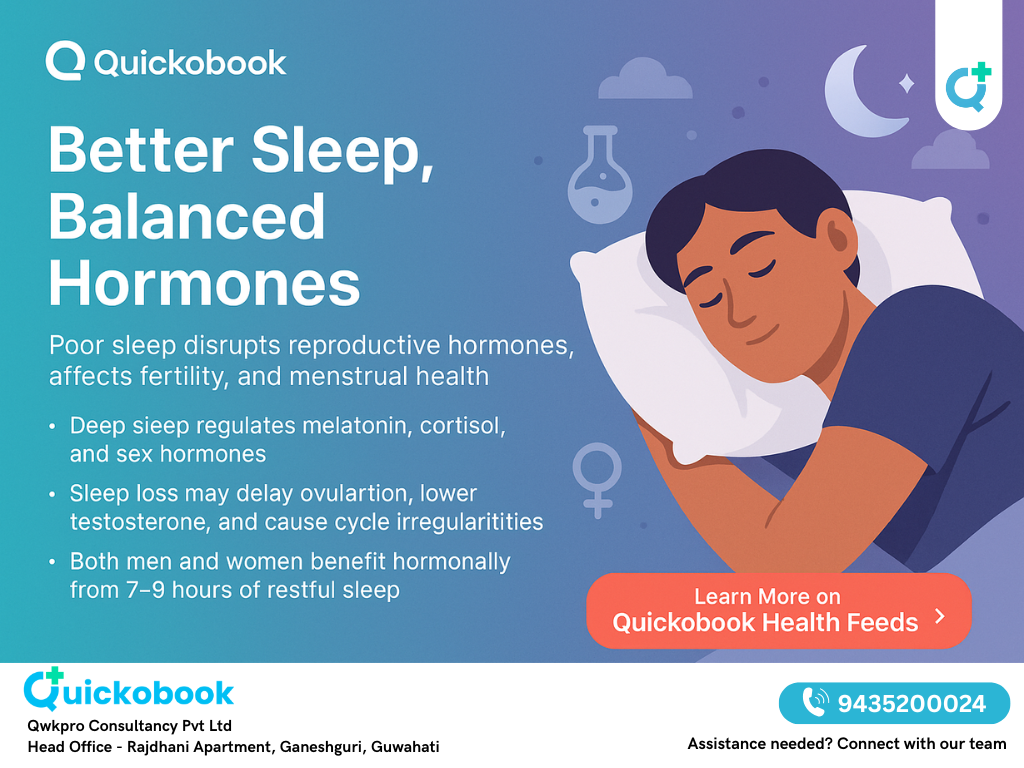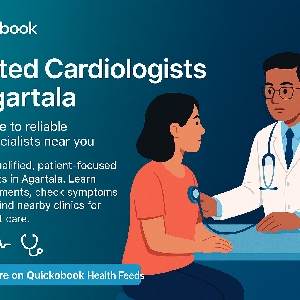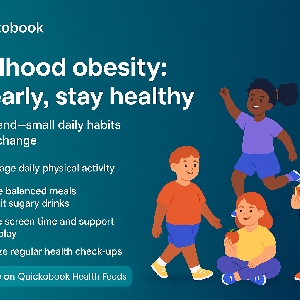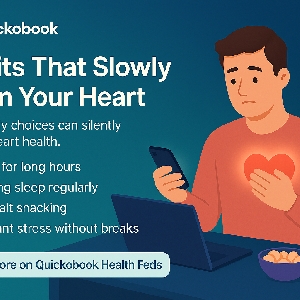Introduction
Sleep is not just about rest. It is a biological necessity that impacts nearly every function in the body. Poor sleep quality can interfere with hormone regulation, menstrual cycles, fertility, and reproductive health. For women, sleep disturbances may worsen conditions like polycystic ovary syndrome (PCOS), while in men, poor sleep may lower testosterone and sperm quality. Both men and women may require guidance from a gynaecologist, urologist, or general physician if sleep issues persist.
This guide explores how sleep affects hormones, fertility, and reproductive health, along with prevention, lifestyle tips, and medical treatment options in India.
Sleep and Hormones: An Overview
- Hormones are chemical messengers that control growth, metabolism, reproduction, and mood.
- Sleep regulates hormone production, especially melatonin, cortisol, estrogen, progesterone, and testosterone.
- Disrupted sleep can cause irregular menstrual cycles, low libido, erectile dysfunction, infertility, and complications in pregnancy.
Causes of Poor Sleep Affecting Reproductive Health
- PCOS and Hormonal Imbalance – Women with PCOS often suffer from poor sleep due to insulin resistance and obesity.
- Stress and Cortisol – Stress raises cortisol levels, disturbing ovulation and testosterone levels.
- Sleep Disorders – Insomnia, sleep apnea, and restless leg syndrome affect reproductive hormone balance.
- Lifestyle Habits – Late-night screen use, irregular sleep schedules, and high caffeine intake affect melatonin.
- Medical Conditions – Diabetes, thyroid issues, and obesity worsen sleep quality and fertility.
Symptoms Linking Sleep Issues and Reproductive Health
- Irregular or missed periods (common in PCOS)
- Infertility or difficulty conceiving
- Erectile dysfunction or low sperm count in men
- Low libido in both men and women
- Mood swings, anxiety, or depression
- Fatigue and low energy during the day
- Increased risk of miscarriage or pregnancy complications
READ ALSO: The Role Of Nutrition In Improving Fertility And Sexual Health
Diagnosis
A general physician, gynaecologist, or urologist may use:
- Sleep studies (to check for sleep apnea or insomnia)
- Blood tests (to measure hormone levels like estrogen, progesterone, testosterone, thyroid)
- Ultrasound (for PCOS and reproductive health assessment)
- Fertility evaluations (sperm analysis, ovulation tracking)
Treatment Options
1. Medical Treatment
- For PCOS: Birth control pills, metformin, or hormone therapy (as prescribed by a gynaecologist).
- For Men: Urologists may recommend testosterone therapy or lifestyle changes for low sperm count.
- Sleep Disorders: CPAP machines for sleep apnea, or prescribed sleep medication (only under doctor’s supervision).
2. Lifestyle Changes
- Follow sleep hygiene practices – consistent bedtime, dark room, no late-night gadgets.
- Exercise daily but avoid late-night workouts.
- Limit caffeine, alcohol, and heavy meals before bed.
- Maintain a balanced diet with adequate protein, vitamins, and minerals.
3. Stress Management
- Yoga, meditation, and breathing exercises
- Therapy or counselling if anxiety affects sleep
Prevention
- Prioritise 7–8 hours of quality sleep.
- Seek regular check-ups with a general physician.
- Women with PCOS should maintain a healthy weight and diet.
- Men with fertility issues should avoid smoking, alcohol, and excessive stress.
- Couples planning pregnancy should consult a gynaecologist or urologist for preconception counselling.
When to See a Doctor
Consult a doctor if you experience:
- Irregular menstrual cycles for more than 3 months
- Difficulty conceiving after 6–12 months of trying
- Erectile dysfunction or low libido
- Excessive fatigue despite enough sleep
- Suspected sleep apnea (snoring, choking during sleep)
- PCOS symptoms like excessive hair growth, weight gain, and acne
Risks and Complications
- Infertility in both men and women
- Higher risk of miscarriage in women with PCOS and poor sleep
- Erectile dysfunction and reduced sperm motility in men
- Increased risk of diabetes, obesity, and heart disease due to hormonal imbalance
Conclusion
Sleep is a silent healer. Poor sleep disrupts hormones, leading to PCOS complications, fertility problems, and reproductive challenges. Timely medical help from a gynaecologist, urologist, or general physician can prevent long-term risks. By adopting healthy sleep habits and lifestyle changes, individuals can improve both hormonal balance and reproductive health.
Quickobook Call-to-Action (CTA)
- Book a gynaecologist online for PCOS and fertility issues.
- Consult a urologist for male fertility and sleep-related problems.
- Find a general physician near you through Quickobook for sleep and hormone assessments.
Your health journey begins with the right doctor. Quickobook connects you to trusted specialists across India.
Disclaimer
This blog is for educational purposes only and should not replace professional medical advice. Always consult a qualified doctor before starting any treatment or medication. Dosage and therapy vary depending on individual needs.
50 Frequently Asked Questions (FAQs)
Q1. How does sleep affect reproductive health?
A. Poor sleep disrupts hormones like estrogen, progesterone, and testosterone, leading to fertility problems and PCOS complications.
Q2. Can PCOS cause sleep problems?
A. Yes, women with PCOS often experience insomnia and sleep apnea due to hormonal imbalance and obesity.
Q3. Does poor sleep affect male fertility?
A. Yes, lack of sleep lowers testosterone and reduces sperm quality, impacting fertility.
Q4. Can a gynaecologist help with sleep-related fertility issues?
A. Yes, gynaecologists treat PCOS, irregular cycles, and infertility linked to sleep disorders./
Q5. How many hours of sleep are needed for healthy fertility?
A. Most adults need 7–8 hours of quality sleep for balanced hormones and reproductive health.
Q6. Does sleep quality affect IVF success?
A. Yes, poor sleep may reduce IVF success rates by affecting hormone levels and egg quality.
Q7. Can sleep apnea affect reproductive health?
A. Yes, sleep apnea raises stress hormones, which can disturb ovulation and lower testosterone.
Q8. What foods improve sleep and fertility?
A. Foods rich in magnesium, vitamin D, and omega-3s like nuts, seeds, fish, and leafy greens help.
Q9. Does insomnia affect pregnancy chances?
A. Yes, chronic insomnia can disturb ovulation, sperm production, and implantation success.
Q10. Can a general physician diagnose sleep-related fertility issues?
A. Yes, a GP can order hormone tests, recommend sleep studies, and refer to specialists.
Q11. Can men with erectile dysfunction benefit from better sleep?
A. Yes, improved sleep boosts testosterone and can improve sexual performance.
Q12. Does melatonin affect fertility?
A. Yes, melatonin regulates ovulation and sperm quality, making sleep essential for fertility.
Q13. Can stress-related poor sleep cause infertility?
A. Yes, stress raises cortisol, which disturbs reproductive hormone balance.
Q14. Do urologists treat sleep-related male fertility issues?
A. Yes, urologists treat erectile dysfunction, low sperm count, and hormone-related issues.
Q15. Can yoga improve sleep and fertility?
A. Yes, yoga reduces stress and improves hormonal balance, supporting fertility.
Q16. Is daytime sleep enough for hormone health?
A. Night sleep is best as it aligns with the body’s circadian rhythm.
Q17. Does PCOS worsen with poor sleep?
A. Yes, poor sleep worsens insulin resistance and hormonal imbalance in PCOS.
Q18. Can weight loss improve both sleep and fertility?
A. Yes, losing weight improves sleep quality and reduces PCOS-related fertility issues.
Q19. Should couples planning pregnancy improve sleep first?
A. Yes, healthy sleep improves fertility and pregnancy outcomes for both partners.
Q20. Does shift work affect fertility?
A. Yes, night shifts disrupt circadian rhythm, affecting ovulation and sperm health
Q21. Can lack of sleep delay periods?
A. Yes, poor sleep affects ovulation, leading to delayed or irregular periods.
Q22. Can sleep supplements help with fertility?
A. Some supplements like melatonin may help, but only under medical advice.
Q23. Is napping a substitute for good night sleep?
A. No, naps help short-term fatigue but don’t replace deep restorative night sleep.
Q24. Can thyroid issues cause sleep and fertility problems?
A. Yes, thyroid imbalance affects metabolism, sleep, and reproductive health.
Q25. Does alcohol affect sleep and fertility?
A. Yes, alcohol disrupts sleep cycles and lowers fertility in both men and women.
Q26. Can sleep quality affect libido?
A. Yes, poor sleep lowers testosterone and estrogen, reducing sexual desire.
Q27. Do sleep problems affect menopause?
A. Yes, women in menopause often face insomnia due to hormonal changes.
Q28. Can men with sleep apnea become infertile?
A. Yes, sleep apnea lowers testosterone and sperm production over time.
Q29. Does pregnancy improve or worsen sleep?
A. Pregnancy often worsens sleep due to hormonal and physical changes.
Q30. Can poor sleep cause miscarriages?
A. Yes, research shows a higher miscarriage risk in women with sleep problems.
Q31. Can urologists help with infertility caused by poor sleep?
A. Yes, urologists address male reproductive issues linked to poor sleep.
Q32. Does screen time affect fertility?
A. Yes, blue light reduces melatonin, disturbing sleep and reproductive health.
Q33. Can meditation before bed improve fertility?
A. Yes, meditation lowers stress hormones, improving sleep and fertility.
Q34. Does poor sleep affect sperm motility?
A. Yes, poor sleep lowers sperm motility and count, reducing chances of conception.
Q35. Can general physicians prescribe sleep aids?
A. Yes, but they usually recommend natural remedies first before medication.
Q36. Can infertility treatments fail due to poor sleep?
A. Yes, IVF and IUI success rates are lower in couples with poor sleep quality.
Q37. Is melatonin safe for women with PCOS?
A. Yes, melatonin may help regulate cycles, but consult a gynaecologist first.
Q38. Does poor sleep affect breastfeeding hormones?
A. Yes, it can reduce prolactin, affecting milk production.
Q39. Can men regain fertility by improving sleep?
A. Yes, improving sleep boosts testosterone and sperm quality over time.
Q40. Does sleep affect egg quality?
A. Yes, poor sleep reduces ovarian reserve and egg quality.
Q41. Can sleep therapy help PCOS women conceive?
A. Yes, good sleep improves insulin and hormonal balance, aiding conception.
Q42. Do antidepressants affect sleep and fertility?
A. Some may worsen sleep and lower libido, but doctors can adjust medications.
Q43. Can sleep tracking apps help fertility?
A. Yes, they can identify patterns affecting ovulation and sleep quality.
Q44. Is oversleeping bad for fertility?
A. Yes, more than 9–10 hours of sleep may disturb hormonal balance.
Q45. Can gynaecologists treat sleep apnea in women?
A. They may refer to a sleep specialist while managing fertility-related concerns.
Q46. Can couples improve IVF success by sleeping better?
A. Yes, better sleep improves hormone balance, egg, and sperm quality.
Q47. Does sleep deprivation affect puberty?
A. Yes, lack of sleep delays puberty and sexual development in teenagers.
Q48. Can men with low libido improve it by sleeping more?
A. Yes, sleep increases testosterone, boosting sex drive.
Q49. Does caffeine late at night affect fertility?
A. Yes, caffeine disrupts sleep, affecting reproductive hormones.
Q50. Can sleep quality reduce PCOS symptoms naturally?
A. Yes, better sleep reduces insulin resistance and balances hormones in PCOS.









Comments (0)
No comments yet. Be the first to share your thoughts!
Leave a Comment